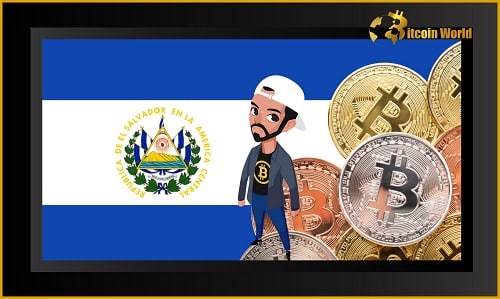The crypto world is currently navigating a sea of fear, uncertainty, and doubt (FUD), with market dips becoming the norm. But amidst this bearish sentiment, El Salvador’s President Nayib Bukele remains steadfast in his bullish Bitcoin strategy. In a recent move that has once again sparked both excitement and criticism, President Bukele announced that El Salvador’s treasury has acquired another 410 Bitcoins, spending a cool $15 million. Let’s dive into what this means for El Salvador and the broader crypto adoption narrative.
In his signature tweet style, President Bukele quipped:
“Nope, I was wrong, didn’t miss it.
El Salvador just bought 410 #bitcoin for only 15 million dollars ?
Some guys are selling really cheap ??♂️ https://twitter.com/nayibbukele/status/1484618494572310531?ref_src=twsrc%5Etfw — Nayib Bukele ?? (@nayibbukele) January 21, 2022”
This latest purchase brings El Salvador’s total Bitcoin holdings to approximately 1400 BTC. President Bukele views the current market downturn not as a cause for alarm, but rather as an opportune moment to accumulate more Bitcoin at a discount. This strategy of “buying the dip” is a common tactic among crypto enthusiasts who believe in the long-term value proposition of Bitcoin.
The Critics Are Out: Is El Salvador’s Bitcoin Bet Going Sour?
However, not everyone shares President Bukele’s optimism. El Salvador’s Bitcoin experiment has been under intense scrutiny since the country adopted Bitcoin as legal tender in September 2021. Critics, like Bitcoin opponent Peter Schiff, have been vocal about their concerns. Schiff didn’t hold back in his response to Bukele’s latest purchase, tweeting:
“That means you wasted over $36,500 per Bitcoin. If you want to make bad bets on Bitcoin do it with your own money. Why didn’t you include in your tweet how many Bitcoin you HODL, and how much money you have already lost. I warned you not to buy the last dip. Don’t buy the next!”
Schiff’s criticism highlights a key concern: the unrealized losses El Salvador is currently facing on its Bitcoin investments. With Bitcoin’s price volatility, the value of El Salvador’s holdings has fluctuated significantly. While Bukele views this as a long-term investment, the immediate impact on the country’s finances is a subject of debate.
Adding to the pressure, Moody’s Investors Service downgraded El Salvador’s credit rating last year. The country’s USD bonds have also experienced a decline since the Bitcoin adoption, raising concerns about El Salvador’s financial stability and its ability to meet its debt obligations. These factors paint a complex picture of El Salvador’s economic landscape amidst its Bitcoin experiment.
Bitcoin-Backed Loans: A Silver Lining for Salvadoran Small Businesses?
Despite the criticisms and economic headwinds, President Bukele remains undeterred. El Salvador is pushing forward with its Bitcoin strategy, exploring innovative ways to integrate cryptocurrency into its economy. One such initiative is the proposal to offer Bitcoin-backed loans to small businesses.
This program aims to address a critical need in El Salvador: access to affordable financing for small and medium-sized enterprises (SMEs). Traditional lending can be difficult for small businesses to secure, often involving high interest rates and stringent requirements. Bitcoin-backed loans could potentially offer a more accessible and efficient alternative.
Potential Benefits of Bitcoin-Backed Loans for Salvadoran SMEs:
- Increased Access to Capital: Bitcoin-backed loans could open up new avenues for funding, especially for businesses that are unbanked or underbanked.
- Lower Interest Rates: Decentralized finance (DeFi) models, often associated with crypto lending, can potentially offer more competitive interest rates compared to traditional banks.
- Faster Loan Processing: Crypto transactions are typically faster than traditional banking processes, potentially leading to quicker loan disbursement.
- Financial Inclusion: By leveraging Bitcoin, El Salvador can promote financial inclusion, bringing more people into the formal financial system.
However, it’s important to acknowledge the potential challenges and risks associated with Bitcoin-backed loans:
- Volatility Risk: The fluctuating price of Bitcoin could make loan repayment unpredictable for businesses if the loan terms are not carefully structured.
- Regulatory Uncertainty: The regulatory landscape for crypto lending is still evolving globally, and El Salvador needs to establish clear guidelines to ensure consumer protection and financial stability.
- Adoption and Education: For Bitcoin-backed loans to be successful, widespread adoption and education are crucial. Small business owners need to understand how these loans work and how to manage Bitcoin effectively.
Looking Ahead: El Salvador’s Bold Crypto Experiment
El Salvador’s journey with Bitcoin is a fascinating case study in real-time. It’s a bold experiment with potentially significant implications for global adoption. While the country faces economic pressures and criticisms, President Bukele’s unwavering commitment to Bitcoin and his innovative initiatives like Bitcoin-backed loans demonstrate a long-term vision.
Whether El Salvador’s Bitcoin bet will ultimately pay off remains to be seen. The crypto market is inherently volatile, and the global economic landscape is constantly shifting. However, El Salvador’s experiment is undoubtedly pushing boundaries, sparking conversations, and paving the way for other nations to consider the possibilities of cryptocurrency adoption. The world is watching closely to see what the future holds for El Salvador and its pioneering foray into the world of Bitcoin.
Related Posts – Ex-SEC Chair, Jay Clayton Believes Cryptocurrency Industry Is For Long Haul
Disclaimer: The information provided is not trading advice, Bitcoinworld.co.in holds no liability for any investments made based on the information provided on this page. We strongly recommend independent research and/or consultation with a qualified professional before making any investment decisions.




